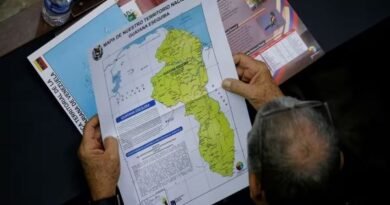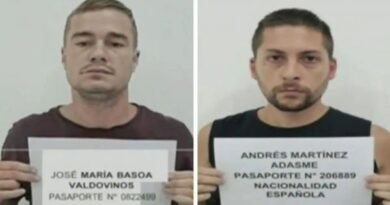Guyana asks The Hague court to stop Venezuelan referendum on the annexation of half of its territory
[ad_1]
Guyana asks The Hague court to stop Venezuelan referendum on the annexation of half of its territory
The former British colony of Guyana has the world’s biggest reserves of crude per capita, while Venezuela sits on the largest proven reserves overall.
Guyana has asked the UN’s highest court to stop a Venezuelan referendum on the annexation of the Esequibo, half of its territory and its oil-rich offshore, a claim going back to colonial times.
Venezuela has for decades argued that the 160,000-square-kilometer Esequibo region under Guyana domain should fall within its borders — a contention that reached the International Court of Justice (ICJ) in The Hague. The dispute has intensified since ExxonMobil discovered massive oil deposits in the Essequibo offshore in 2015.
The former British colony of Guyana has the world’s biggest reserves of crude per capita, while Venezuela sits on the largest proven reserves overall.
As the dispute intensified, Venezuela recently announced it would hold a referendum on the issue on December 3, a move Guyana — which dragged Caracas to the ICJ in 2018 — described as illegal.
In a statement on Tuesday, the government in Georgetown denounced what it called Venezuela’s sinister plan for seizing Guyanese territory. It said it had sought the ICJ’s urgent protection in a request filed Monday for an order for Venezuela not to proceed with the plebiscite as is.
Guyana insisted the Venezuelan referendum constituted a naked threat of territorial aggression and reiterated that any seizure of Guyana territory would constitute the international crime of aggression.
Given the urgency of the matter, it asked the court to schedule an oral hearing at the earliest possible date in advance of December 3.
Caracas, for its part, said its neighbor’s petition if it weren’t so tragic, would be laughable.
Vice President Delcy Rodriguez accused Georgetown of seeking to get Caracas to repeal its constitutional order, which is not going to happen.
The International Cour of Justice statement did not specify when it was likely to rule on Georgetown’s request.
In its filing, Guyana argued the referendum’s only purpose was to obtain responses that would support Venezuela’s decision to abandon the ICJ proceedings and allow for its formally annexing and integrating Essequibo into Venezuela.
The Essequibo region makes up more than two-thirds of Guyana and is home to 125,000 of its 800,000 residents, according to a decade-old census.
Guyana says its border with Venezuela was fixed by an arbitration tribunal in 1899. But Venezuela, which is under international sanctions after an unrecognized election and a clampdown on antigovernment protests, says the Essequibo river to the east of the region forms a natural frontier recognized at the time of independence from Spain.
The proposed wording for the referendum describes the border as fraudulently imposed in 1899 and suggests the granting of Venezuelan citizenship to the people of an annexed Essequibo.
Commonwealth support for Guyana
The Commonwealth Secretary-General the Rt. Hon. Patricia Scotland, KC has expressed deep concern at the decision of the Venezuelan National Assembly to undertake a referendum on the status of the Essequibo region, part of the sovereign territory of the Government of the Cooperative Republic of Guyana.
Speaking on the escalation the Secretary-General said:
“The Commonwealth stands with the Government and people of Guyana and with our partners in CARICOM in expressing our concern over the questions in the planned referendum.
“And the Commonwealth continues to stand for the rule of law and, “reaffirms its firm and steadfast support for the maintenance and preservation of the sovereign and territorial integrity of Guyana, and the unobstructed exercise of its rights to develop the entirety of its territory for the benefit of its people”.
The five questions approved by the National Electoral Council to be included in the referendum undermine Guyana’s territorial integrity and sovereignty and their intent is contrary to international law. Question 5 proposes the creation of Venezuelan state of Guyana Essequibo and an accelerated plan for giving Venezuelan citizenship and identity cards to the Guyanese population. International law prohibits the seizure and annexation by one country of the territory of another. The language in these questions contributes to heightened tension and is a threat to peace and stability in a member state of our Commonwealth Family and indeed in the wider Caribbean region.
At the last meeting of the Commonwealth Ministerial Group on Guyana, the Group,
“Reaffirmed its unwavering support for the judicial process underway before the International Court of Justice, chosen by the Secretary General of the United Nations under the 1966 Geneva Agreement and the Group continues to encourage Venezuela to participate in the said process.”
The International Court of Justice (ICJ) determined in April of this year that it had legal jurisdiction over this longstanding issue and the Commonwealth supports the use of the ICJ to adjudicate on the matter. The referendum goes against the spirit of peaceful dispute resolution.
[ad_2]
Source link




